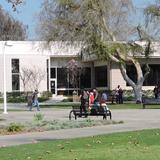- College of the Sequoias is a comprehensive community college focused on student learning. Our mission is to help our diverse student population achieve their transfer and /or occupational objectives and to advance the economic growth and global competitiveness of business and industry within our region.
School Highlights
College of the Sequoias serves 16,781 students (33% of students are full-time).
The college's student-teacher ratio of 28:1 is lower than the state community college average of 32:1.
Minority enrollment is 81% of the student body (majority Hispanic), which is more than the state average of 77%.
Quick Facts (2026)
- Enrollment: 16,781 students
- In-state tuition: $1,362
- Out-state tuition: $6,138
- Student-teacher ratio: 28:1
- Minority enrollment: 81%
- Source: Integrated Postsecondary Education Data System (IPEDS)
Top Rankings
College of the Sequoias ranks among the top 20% of public schools in California for:
Category
Attribute
Community Size
Debt For Students
School Overview
The teacher population of 603 teachers has stayed relatively flat over five years.
College of the Sequoias
(CA) Community College Avg.
Carnegie Classification
Associate's Colleges: High Transfer-High Traditional
Baccalaureate/Associate's Colleges: Associate's Dominant
Institution Level
At least 2 but less than 4 years
At least 2 but less than 4 years
Institution Control
Public
Public
Colors
Blue, Orange
Total Faculty
603 staff
315 staff
School Calendar
Student Body
The student population of College of the Sequoias has grown by 33% over five years.
The student-teacher ratio of 28:1 has decreased from 44:1 over five years.
The College of the Sequoias diversity score of 0.47 is less than the state average of 0.70. The school's diversity has declined by 9% over five years.
Total Enrollment
16,781 students
9,796 students
Student-Teacher Ratio
28:1
32:1
# Full-Time Students
5,456 students
1,259 students
# Part-Time Students
11,325 students
8,537 students
# Enrollment Undergraduate
167 students
242 students
# Full-Time Undergraduate Students
5,456 students
1,250 students
# Full-Time Graduate Students
n/a
63 students
# Part-Time Undergraduate Students
11,325 students
8,299 students
# Part-Time Graduate Students
n/a
10 students
Total Dormitory Capacity
n/a
121 students
% American Indian/Alaskan
n/a
n/a
% Asian
3%
13%
% Hispanic
70%
47%
% Black
2%
7%
% White
19%
23%
% Hawaiian
n/a
1%
% Two or more races
3%
5%
% Non Resident races
n/a
1%
% Unknown races
2%
3%
Diversity Score
0.47
0.70
College Completion Rate (Students who graduate in less than 4 years)
31%
42%
College Completion Rate (Students who graduate in 4 years or more than 4 years)
n/a
43%
Average Graduate Earnings (10 Years)
$30,400
$34,700
Tuition and Acceptance Rate
The public in-state tuition of $1,362 is less than the state average of $1,516. The in-state tuition has stayed relatively flat over four years.
The public out-state tuition of $6,138 is less than the state average of $6,779. The out-state tuition has declined by 26% over four years.
In-State Tuition Fees
$1,362
$1,516
Out-State Tuition Fees
$6,138
$6,779
% Students Receiving Some Financial Aid
81%
85%
Median Debt for Graduates
$5,625
$10,500
Median Debt for Dropouts
$4,000
$6,239
Acceptance Rate
n/a
93%
Source: 2024 (or latest year available) Integrated Postsecondary Education Data System (IPEDS)
School Notes
- School Mascot: Giant
- College of the Sequoias is a public, two-year community college with an enrollment of just over 10,000 students. Located in Visalia, California, the campus is halfway between Los Angeles and San Francisco. Our administration, faculty and staff are committed to the advancement of economic growth and to our mission of preparing students for productive work, lifelong learning and community involvement. COS has comprehensive offerings that include: transfer programs, occupational-technology programs and basic skills. In addition, COS is very proud of the educational support offered to students and is dedicated and highly committed to enhancing our diverse educational and cultural campus environment. From its opening in the fall of 1926 until World War II the district's sole mission was to provide inexpensive, lower-division college education to local high school graduates who intended to transfer to a traditional four-year college. This "transfer" mission shaped the college during these years in that it provided the theoretical and political basis for its founding, defined its initial curriculum and activities, led to the construction of its campus, and met the needs of the overwhelming majority of its students. In athletics, the Giants offer 18 intercollegiate sports and have a rich and successful tradition. The school has won state championships in football, men's basketball, women's basketball, baseball, softball, golf, and wrestling. The Giants have also hosted three of the last five state championship football games (2000, 2001, and 2004).
Frequently Asked Questions
How much does College of the Sequoias cost?
College of the Sequoias's tuition is approximately $1,362 for In-State students and $6,138 for Out-State students.
What is College of the Sequoias's ranking?
College of the Sequoias ranks among the top 20% of community college in California for: Largest student body and Least debt for graduating students.
Recent Articles

5 Key Community College Trends Parents Should Know in 2026
Explore major 2026 community college trends including enrollment changes, costs, career programs, and affordability for parents planning college decisions.

Average Community College Tuition Cost 2026 Update
Explore updated 2026 community college tuition averages, cost trends, planning tips, admissions timing advice, and financial strategies for families and students.

Preparing for Placement Tests in 2026: Student Guide
Preparing for Placement Tests in 2026, what students, parents, and educators need to know about formats, prep strategies, and placement changes.










